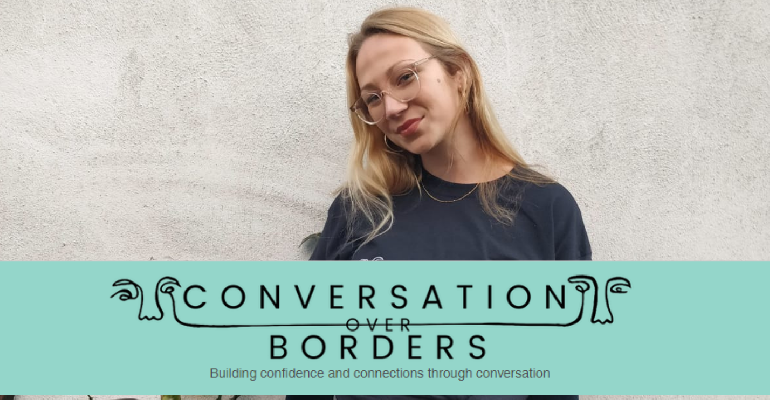
The coronavirus lockdown has left many of us with an urge to help others, whether it's the elderly; rough sleepers; survivors of domestic abuse; or even asylum seekers. The pandemic has hit vulnerable groups hard in many ways.
That's exactly what one woman from Brighton was thinking last year when Boris Johnson told us to "stay at home".
'Home' is not the same for everybody, and one group Colette Batten-Turner (pictured above) had on her mind was asylum seekers and refugees.
She said:
"I felt that this idea of 'stay at home' didn't really account for people who weren't necessarily living in a home space.
"I was aware from previous work with asylum seekers that being separated from friends and family was really the day-to-day reality for a lot of asylum seekers and refugees in this country.
"I was also hyperaware of the additional pressure it would place on those living in temporary and emergency accommodation, which are sometimes not be the nicest environments to live in."
Colette is the founder of Conversation Over Borders, an organisation founded around April 2020 during the first national lockdown. Its aim is to connect volunteer English tutors (anyone who's a native speaker) with asylum seekers and refugees in one-to-one English conversation classes.
The focus is on improving spoken fluency, helping people find a job, integrate better within their workplace and the UK. The other outcome from connecting people during a time of social isolation is an overwhelmingly positive impact on people's mental health.
It all began with around twelve people Colette got in touch with, mostly student volunteers, but quickly expanded into the general population. A year later and Conversation Over Borders has connected around 175 volunteers with around 152 learners, and it has a constant waiting list which was at around 40 in February 2021.
One refugee from Uganda, who wishes to remain anonymous, told More Radio he was so grateful for the lessons. The learner said his pronunciations, spelling and reading had improved a lot after around seven months of weekly one-to-one sessions.
He said:
"When I've been on my own and I have the online class with Megan I feel so happy. Because of the pandemic I can't go anywhere, it affects me.
"When Megan teaches me it helps my mental health. Sometimes I feel I'm so isolated and I need to talk...
"We talk, we laugh, I even tell her: I'm so glad I have someone to talk to."
Megan is a Masters student living in Dorset at the moment, she said she jumped at the chance when Colette mentioned the idea last year because she has an interest in teaching.
She said it's had a positive impact on her life too, especially while living alone.
Megan said:
"Coming into lessons we both just had such a giggle, obviously we do teaching as well but we always have a laugh.
"It's the company that really helps, we forget about the lockdown and it's like having a chat with your friend. The one lesson per week makes me less lonely, and also seeing him progress every week gives me a confidence boost.
"I would highly recommend anyone with a spare hour a week to join and see what you can do, because you're really helping someone who is in need of it by using skills you already have."
Feedback from the classes has been overwhelmingly positive. Surveys between May 2020 and January 2021 revealed that 100% of learners who responded (approximately 47%) felt their confidence had improved, 80% said they felt their English had improved by one or two levels.
More than 80% of volunteers who responded (approximately 60%) said they felt less socially isolated, 96% said they'd benefited from cultural exchange and 78% said they'd learnt more about the situation of refugees and asylum seekers in the UK.
Other than facilitating these lessons by connecting people and providing resources, the organisation works on campaigns to raise awareness of things like changes in government policy and contemporary migration issues.

Going forward Colette said Conversation Over Borders is trying to consolidate what it offers and develop partnerships with other organisations. One of the newest services being offered is wellbeing support. Officers are now on hand to help both volunteers and learners by hosting events, providing resources and helpful tips.
Group classes have also been launched for those waiting for one-to-one lessons, or for those wanting additional contact hours.
Colette said:
"Ideally what we want is asylum seekers coming through Conversation Over Borders, having their social isolation needs met, learning English, and then almost graduating from our services. Once they have their refugee status they can move onto the launch pad collective English course, and then go on to find employment."
To find out more about Conversation Over Borders and how to get involved click here.


 Two Men Arrested In Connection With Brighton Rape
Two Men Arrested In Connection With Brighton Rape
 Appeal Following Assault In Horsham Shop
Appeal Following Assault In Horsham Shop
 Appeal After Arson At Gym In Burgess Hill
Appeal After Arson At Gym In Burgess Hill
 Two Men Sought In Connection With Brighton Rape
Two Men Sought In Connection With Brighton Rape
 Councillors Support Baby Box Partnership With Charities
Councillors Support Baby Box Partnership With Charities
 Brighton And Hove Bus Fare Cap Bid Foiled By Cost
Brighton And Hove Bus Fare Cap Bid Foiled By Cost
 New Medical Centre Scoping Exercise Agreed By Wealden Council
New Medical Centre Scoping Exercise Agreed By Wealden Council
 'Out Of This World' Ideas Put Forward For Future Of Brighton i360
'Out Of This World' Ideas Put Forward For Future Of Brighton i360
 New Fire Engines For West Sussex
New Fire Engines For West Sussex
 Sussex Setback For Travellers As Application Set For Snub
Sussex Setback For Travellers As Application Set For Snub